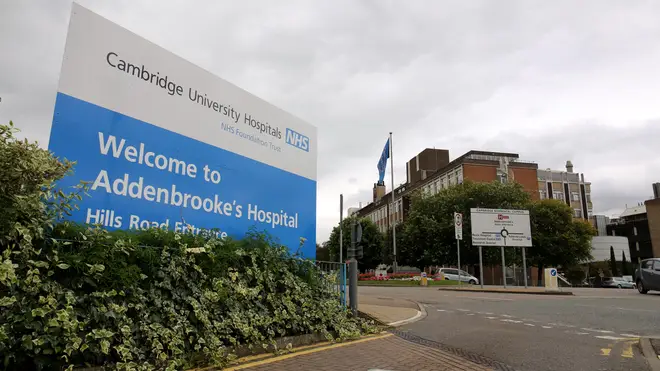
Matthew Wright 7am - 10am
6 November 2021, 18:49

A hospital boss has warned patients may be despatched up to 88 miles away for treatment in a stark message to staff over a bed crisis at its hospital.
Chief executive Roland Sinker told workers at Addenbrooke's University Hospital in Cambridge that a "plan B" option was to send patients to hospitals in Birmingham or London if they were unable to resolve its ongoing issues relating to beds.
During the internal meeting last week, Mr Sinker said 150 beds were closed for infection control – meaning new patients were not able to use them – as a result of the rising number of Covid-19 cases being admitted.
Around 100 beds are now closed to new admissions, with 40 beds being empty as part of the infection control measures. The hospital has around 1,000 beds in total.

James O'Brien reflects on plans to fire unvaccinated care home staff
As a result, Addenbrooke's has been forced to postpone elective surgeries for some patients.
In a transcript from the meeting, seen by the Cambridge Independent, Mr Sinker said the hospital was "barely coping" before the coronavirus outbreak last year and the reduction of beds means Addenbrooke's is "ceasing to function as a hospital".
He added the meeting was being held as a "call to arms", adding that if there is not a change in the way that the hospital currently works it is in "real trouble".
He said: "I came here in 2015 and we were rated inadequate by the CQC [Care Quality Commission]. We had a £90m deficit. I have to say, I'm much more anxious and scared now than I was then.
Read more: Raab says 'green' prison will teach inmates skills to get into work
"The plan B for us is, effectively, Cambridge University Hospitals, which has been around for 250 years, thinking about restricting access to care and saying to patients, you know: 'I'm terribly sorry we can't look after you. You're going to have to think about going to another hospital.' And those hospitals need to be in London and Birmingham. We're going to the heart of the sun."
The deputy chief executive of NHS Providers, Saffron Cordery, said that other NHS trust leaders across England are facing the same worries, adding they are under "significant pressures" and are "increasingly concerned as we move further into a difficult winter."
She said: "Capacity is being constrained through a combination of rising demand, staff shortages, infection prevention control measures, continuing rise in Covid-19 hospitalisations, and long waiting lists due to the pandemic.
"The NHS has lost over 4,500 general and acute beds, compared to before the pandemic, due to the need for stringent Covid-19 infection control measures.
"On top of that, significant pressures across the health and social care system are having a major impact on whether patients can leave hospital in a timely way when they are medically fit to do so.
"Not only can extended stays in hospital be detrimental for patients, but they are restricting trusts' ability to bear down on the backlog for those waiting for treatment as well."
She called for the government to commit to permanent funding for discharge to assess, a model where patients who no longer need a hospital bed but still require care can be discharged and treated at home.
The scheme is due to end on 31 March next year and the government has said it will not fund care delivered after this date.
"Trusts need to see a national workforce plan, continued dedicated funding for discharge to assess, and investment in social care and public health," she said.
"These long-standing fault lines have been significantly exacerbated by the impact of Covid-19 and they cannot be addressed overnight."
A spokesperson for Cambridge University Hospitals said: "Due to a recent rise in patients with Covid being treated at Addenbrooke's, the hospital is under extreme pressure and is calling for all those in our community to pull together to try and reduce infection rates.
"We are managing the needs of Covid patients while striving to deliver surgical, outpatients, diagnostic and emergency care at the same rate or even higher than before Covid-19.
"Please help us by getting your flu and Covid vaccinations, and maintain hand hygiene, social distancing and mask-wearing in crowded places."
The Department for Health and Social Care and NHS England have been approached for comment.